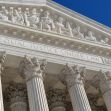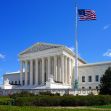The Supreme Court recently held oral arguments addressing whether unions can be held responsible for damage to a company caused by a union-backed strike. The Court’s conservative supermajority appeared to favor the business, foreshadowing a continuation of the Court’s pro-business trend.
The case titled Glacier Northwest, Inc. v. International Brotherhood of Teamsters (IBT) concerns whether concrete-distributor Glacier Northwest can sue labor union IBT for damage to its product allegedly caused by a strike. In August 2017, Glacier and the union were negotiating a new labor contract. When negotiations dragged on, the delivery drivers went on strike. According to Glacier, the drivers simply abandoned trucks full of wet cement one day without prior notice, causing Glacier to waste truckloads of concrete that had already been prepped for distribution. The union claims the workers left the cement in workable, storable condition, and that the company chose to damage the product in the process of removing the concrete from the trucks.
Glacier sued IBT in Washington state court, seeking compensation for the loss of the product that didn’t survive the strike as well as losses caused by the company’s failure to fulfill a contract. In December 2021, the Washington Supreme Court ruled that any loss of concrete was “incidental to a strike arguably protected by federal law” and tossed out the company’s claims.
The National Labor Relations Act (NLRA) protects “concerted activity” among employees. The purpose of the law is to even the odds between workers and companies by allowing workers to band together and fight for better working conditions and wages. The Supreme Court has held that the NLRA preempts state-law causes of action that target conduct that is “arguably protected” or “arguably prohibited” by the NLRA. Losing out on business because your workers are striking is the entire point of a strike, and should not be actionable in court.
The Court has, however, found exceptions to the law. Prior Supreme Court decisions have ruled the NLRA gives no cover for violent behavior, nor should it protect intentional property damage. During oral argument, the justices grappled with the distinction between economic loss caused by a strike, which is not actionable per the NLRA, vs. intentional property damage, which the NLRA does not protect. The union conceded that the NLRA is not all-encompassing: “We absolutely agree that you can't burn down the factory.”
The tenor of the Court’s conservative justices favored Glacier. Businesses and anti-labor organizations, including the U.S. Chamber of Commerce, argue the Washington Supreme Court’s decision implies that intentional destruction of property is protected by the NLRA, in conflict with Supreme Court precedent. A Justice Department lawyer, arguing on behalf of the Biden administration, argued that the failure to “take reasonable precautions to protect employer property” should not be protected by the NLRA and the lawsuit should be revived on those grounds.
Part of the conflict lies in determining whether the decision as to the NLRA’s protections should be decided by the National Labor Relations Board (NLRB) or should instead be decided by a court. Labor groups and unions argue the NLRB is in the best position to make such a decision, serving the long-standing purpose of protecting collective action that ought to be protected. Glacier and its supporters argue they should have the right to make their case in court.
While Supreme Court outcomes are notoriously difficult to predict, the Court has charted a decidedly pro-business approach in recent years. In 2021, for example, the Court struck down a long-standing California law that set a framework for when union organizers should be allowed on agricultural property to talk with workers. The Court said the law violated the Constitution’s “takings clause” by restricting a private business’s right to exclude. California pointed out that such an expansive view of the takings clause “would also imperil a wide variety of health- and safety-inspection regimes,” such as FDA or OSHA inspections.
In Glacier Northwest the Court could chart a middle-ground approach, or it could deliberately gut the NLRA’s protections.






